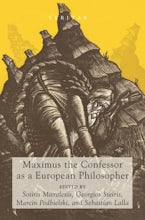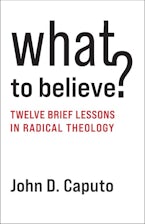- Home
- Veritas
- philosophy
- religion
- Maximus the Confessor as a European Philosopher

Maximus the Confessor as a European Philosopher
Edited by: Sotiris Mitralexis, Georgios Steiris, Marcin Podbielski and Sebastian Lalla
Series: Veritas
366 Pages
- Paperback
- ISBN: 9781498295581
- Published By: Cascade Books
- Published: September 2017
$42.00
It’s nearly a cliché at this point: Maximus the Confessor is having a moment. The editors of Maximus the Confessor as a European Philosopher—Sotiris Mitralexis, Georgios Steiris, Marcin Podbielski, and Sebastian Lalla—acknowledge up front that study of their protagonist has “flourished in recent years” (xxi). The conference from whence this volume comes, a 2014 international colloquium at the Freie Universität Berlin’s Institute of Philosophy under the same title, was itself no small contribution to the Maximian renaissance. Alongside the papers presented there, eighteen in all by senior and junior scholars alike, two additional essays added at the behest of Fr. Maximos Constas comprise this book’s four parts. Philosophical subdisciplines organize the first three: ontology/metaphysics, epistemology, and anthropology. A fourth takes “dialogue” as its aim, placing Maximus in discussion with philosophical predecessors, contemporaries, and posterity. Uniting these four sections is a common effort to thematize the Confessor “as a philosopher” (xxi) as opposed to…what? An appendix by Georgi Kapriev, on the relationship between theology and philosophy in Byzantium, attempts to sort out this question. But it’s a problem that persists throughout the volume. Since a summary of the book’s many riches is not possible, I’ll hew my remarks to this guiding query.
Dionysios Skliris wagers a solution in a programmatic opening essay—the editors call it “the actual introduction” (xxii)—on “The Three Antinomies That Make Maximus an Alternative European Philosopher” (3-23). The Confessor plays the title role, he suggests, by anticipating the “later adventure of the dialectic in the West” while avoiding the pitfalls of “secularization” (9). Maximus, that is, envisions a “conjunction of philosophy and theology,” wherein the former “leads to” the latter without eliding the distinction between them (12). Following Georges Florovsky’s reading of Neochalcedonian Christology, Skliris figures this central Maximian achievement as an “asymmetrical antinomy.” A first pole (divine/theology) is “preponderant” yet preserves the other pole (human/philosophy) in an “interior tension” (6). One wonders why Skliris doesn’t simply call this relation “analogy” as Hans Urs von Balthasar did in his landmark study of Maximus. In either case, there’s an effort to claim for Maximus a prophetic critique of Hegel. Chalcedonian logic, call it a dia-logic (13), saves real difference from its alleged dialectical demise. Skliris, at any rate, takes from this non-dialectical dialectic—it’s an antinomy, recall—license to read Maximus sub specie philosophiae. The Confessor’s texts yield genuinely philosophical insights even if these are ultimately ordered to theological conclusions. An irreducible “gap” distinguishes and paradoxically unites natural knowledge of God and divine revelation (18). We’ve here an apology for the present volume, and a Maximian “metaphysics” in outline (cf. 15-18).
Other authors sidestep the broader theoretical questions posed by Skliris and treat specific philosophical topics instead. Torstein Tollefsen, for instance, plunges into the texts and places Maximus’s contributions to holomerism, “the philosophy of whole and part” (26), against a Neoplatonic backdrop. Three separate essays—by John Panteleimon Manoussakis, Michail Mantzanas, and Sotiris Mitralexis—take up the prominent theme of motion (κίνησις) in Maximus’s corpus, and ask how his account of the timeworn toposcompares to philosophers ancient (Anaxagoras, Aristotle) and modern (Kierkegaard). Fr. Maximos Constas, translator of the recent English rendering of the Ambiguaand a forthcoming edition of theQuaestiones ad Thalassium, conjures a “philosophy of language” from the Confessor and wonders about his debts to Gregory of Nyssa. An essay by Demetrios Harper treats (what one hesitates to call) the problem of “free will,” and argues against a compatibilist interpretation of Maximus despite the obvious Stoic provenance of “self-determination” (αὐτεξούσιος). Philosophers might read each of these chapters with profit and ease.
It is somewhat less clear, though, what makes other essays in the volume specifically philosophical. Why, for example, ought a philosopher care about Maximus’s trinitarian theology, aspects of which are ably detailed in Vladimir Cvetković’s essay on “The Oneness of God as Unity of Persons” in the Confessor’s work? To be sure, Cvetković devotes a section to “The Philosophical Aspect” of the Maximian approach to trinitarian relations, but no Neoplatonic texts are actually quoted (308-310). Besides, it’s hardly uncommon for theological scholarship, historical and systematic, to note the philosophical context of a given author. This does not diminish the quality of the essay—Cvetković’s discussion of the Capita de caritate, in particular, is illuminating—but it does raise questions about the volume’s premise. Two chapters, those by Jordan Daniel Wood and Natalie Depraz, consider the Confessor’s contributions to apophatic theology. The way of negation, no doubt, is not the private path of theology—philosophers from Plotinus to Heidegger have often waxed apophatic. But this only begs the question: if those we consider philosophers are liable to speak like theologians, then what exactly demarcates a philosophical from a theological reading? Where the apophatic is concerned, the distinguishing factor surely can’t be the contentof the discourse. But, in this respect, apophasis only heightens a contradiction ever present in the philosophy-theology dialectic.
That this volume raises questions of disciplinary boundaries has less to do with shortcomings of its own, and rather more to do with unresolved tensions internal to what we call philosophy and theology. In which case, prolegomena like that of Skliris may remain a necessary point of departure. Perhaps, then, I only wish to say it will be difficult to conceive a volume on any given patristic theologian, Maximus included, “as a philosopher” without endorsing an accompanying interpretation of what theology actually means. But then, of course, one will need to ask whether the patristic author in question also endorses the definition so assumed. As regards the present volume, this remains an open question. Skliris, for his part, seems confident the “asymmetrical antinomy” can adequately account for the Confessor’s approach and so carry the project’s weight. There are stirrings, though, that analogy, whether labeled as such or not, lacks the precision proper to Maximus’s daring Neochalcedonian vision. Nevertheless, the editors and contributors have now placed this overarching problematic on the radar of Maximian scholarship. For this, and much else besides, the volume ought to be read with care.
The book is unfortunately riddled with typos. Most are anodyne but some prove theologically disastrous. For example, “Maximus claims that the Λόγοςmade flesh teaches theology by revealing the Fathers [sic] and the Son” (309). Nonetheless, the typeface is a well-set serif font and the occasional Greek text clearly legible, making the book’s 341 pages a pleasure to read. Pleasant, too, is the cover, which handsomely matches the other volumes in Cascade’s Veritasseries.
Taylor Ross is a doctoral student in Early Christianity at Duke University.
Taylor RossDate Of Review:April 11, 2018
Sotiris Mitralexis is assistant professor of philosophy at the City University of Istanbul and visiting research fellow at the University of Winchester.
Georgios Steiris is assistant professor of medieval and Renaissance philosophy at the National and Kapodistrian University of Athens.
Marcin Podbielski is editor-in-chief of Forum Philosophicum, an international journal for philosophy, and teaches philosophy at the Jesuit University Ignatianum in Cracow, Poland.
Sebastian Lalla is assistant professor (Privatdozent) at the Freie Universitat Berlin's Institute of Philosophy and guest professor of philosophy at the National University of Mongolia.











